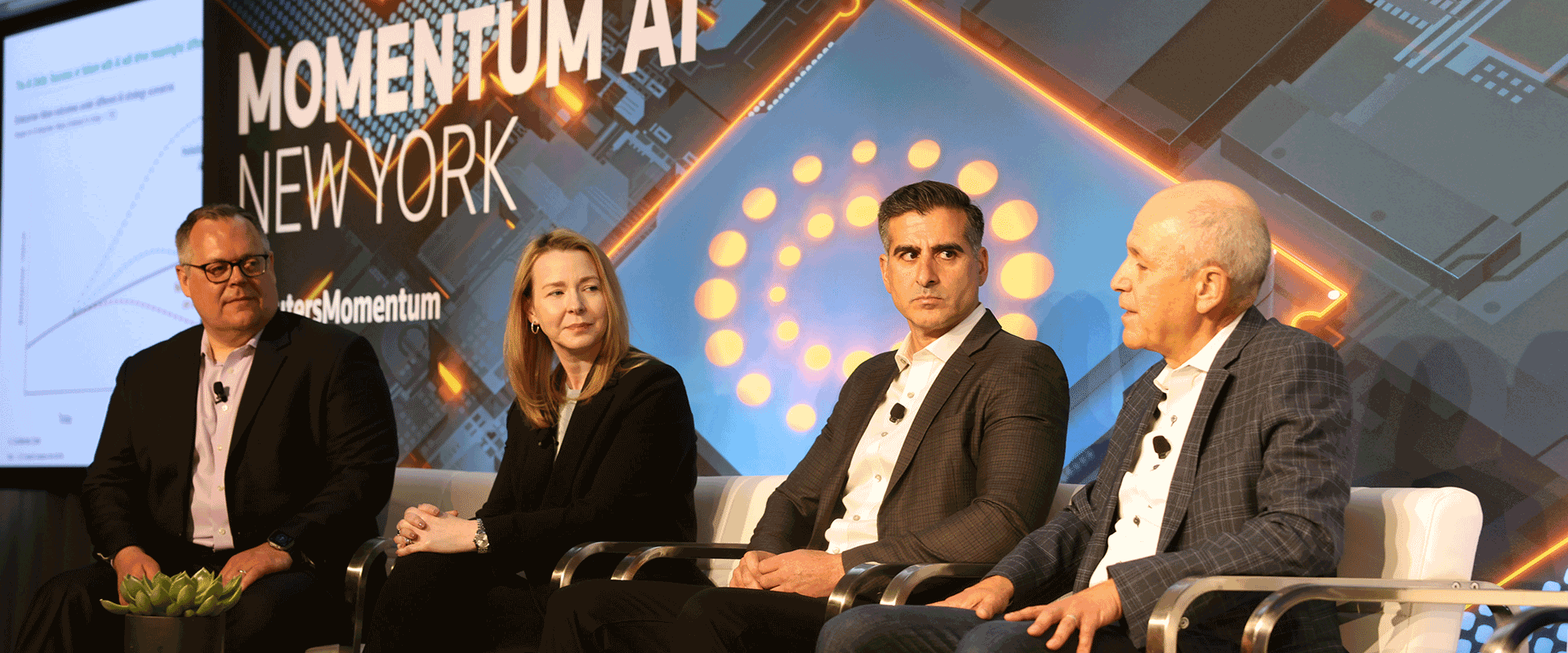
At the Reuters Momentum AI New York 2025 event, executives gathered to discuss how artificial intelligence is moving beyond experimentation with new technology and is becoming a fundamental part of business strategy. The panel, "AI: The View from the Boardroom," moderated by Darren Perry, Managing Director and Partner at L.E.K., featured insights from leaders actively integrating AI across their companies to achieve strategic objectives and drive shareholder value. Joining Darren Perry were industry leaders:
- Jaime Montemayor, Chief Digital and Technology Officer at General Mills
- Sydney Klein, SVP, Chief Security Officer and Head of IT Core Services at Bristol Myers Squibb
- Ali Keshavarz, President of Data and Analytics at CVS Health
From innovation to core strategy
A central theme of the discussion was how AI has shifted from isolated experiments to an essential part of everyday business planning and execution. Panelists agreed that unlocking AI's full potential means deeply embedding it into core strategy—not just treating it as a standalone technology. For instance, CVS Health, whose strategy is “building a world of health around every consumer,” uses AI-driven automation in care management to significantly improve clinical outcomes and patient experiences.
Yet, companies still face what's known as the "AI Delta," the value gap that exists between harnessing AI's full potential and falling behind due to poor strategy or execution (see Figure 1). Executives noted many organizations remain stuck chasing short-term efficiency gains instead of pursuing the broader transformational opportunities AI offers.
While AI-driven efficiency pursuits have their purpose, they are far less likely to create sustaining value in competitive markets than initiatives that foster differentiation or produce new revenue streams. Closing the value gap requires aligning AI initiatives closely with strategic business goals and strong leadership backing.
Business-driven leadership matters
Who leads AI initiatives greatly influences their success. Panelists emphasized that AI gains real traction when business leaders—not just technical specialists—drive the projects. This business-first approach shifts AI from being an experimental side project to a critical operational tool. For example, General Mills puts both commercial and functional leaders in charge of its AI projects, directly linking technology to clear, measurable business results.
Top-down leadership of AI tends to be more successful as it is more likely to identify common business problems across the business — like document summarization and internal knowledge retrieval — and solving them with standardized, reusable AI solutions. This approach reduces redundancy, speeds up implementation, and simplifies adoption across multiple departments.
Building the right culture and governance
A big part of successfully scaling AI involves creating a supportive organizational culture backed by solid governance. Companies that prioritize employee education and provide accessible AI tools create environments where teams feel ready and empowered to adopt AI. Bristol Myers Squibb, for example, has successfully embedded AI into daily workflows through extensive training and collaboration, moving it from theory to practical everyday use.
Robust governance frameworks are also essential to scale AI responsibly. Clear oversight mechanisms and compliance standards help mitigate risks and give teams the confidence to innovate. This structure is especially crucial in regulated industries, where solid governance isn’t just recommended — it's required for sustainable AI deployment.
AI as a strategic advantage
By session's end, it was evident that AI is no longer merely a technological consideration but central to strategy, operational effectiveness, and competitive advantage. Enterprises that align AI rigorously with core strategic goals, promote its use with a top-down & business-driven mandate, and emphasize trustworthy implementation are not just narrowing the AI Delta — they're shaping the future of business leadership in an increasingly AI-driven world.
For more information, please contact us.
L.E.K. Consulting is a registered trademark of L.E.K. Consulting LLC. All other products and brands mentioned in this document are properties of their respective owners. © 2025 L.E.K. Consulting LLC
05062025160504


